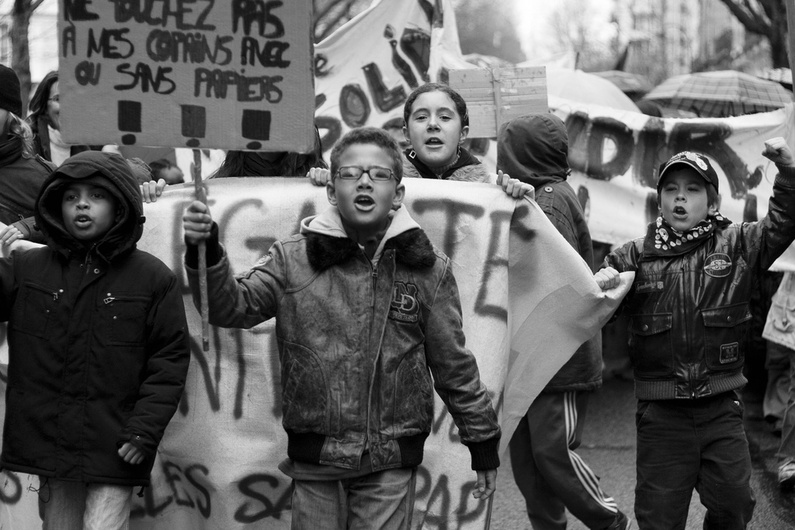
Hostage Taking, Piss And Maple Syrup: Immigration in France
Published on
What is it really like to immigrate to Europe? At a time when European countries impose ever stricter regulations to restrict migration, the English language editor ventures inside the bowels of the French immigration system.
Immigrant. This term has more recently been attached to conotations of a mortal enemy, come from afar to steal jobs and wreak mayhem on so-called 'civilised' European society. The dichotomy of the migrant-villian has been promulgated by the fear mongering of right-wing populist parties, particularly in the UK and France, and their further demonisation of non-nationals in the media. Hardening anti-immigration legislation is passing in parliaments as the gatekeepers of the fortress of Europe batten down the hatches in preparation for an alien invasion.
Well, I am one of those aliens. I hail from the land of beavers and cariboo, where rivers and lakes flow rich with maple syrup and salmon. Yes, we live in igloos and the temperature never ventures above -20°C. Mounties roam the thick forests, outfitted in their red attire, astride on their trusty steeds, as the Chinook winds caresses their oversized rangers. My name is Kait, I am Canadian, and I am here to take over continental Europe (since we are already running several of the most prominent British institutions, including the Royal Mail and the Bank of England. No joke.)
I'm an alien, I'm a legal alien, I'm a Canadian in France.
red tape Hostage
My journey across the Atlantic is best described as a reverse pilgrimage. (For an explanation as to why I don't have an Italian passport, despite being the daughter of a citizen, this article sums it up.) My decision to come to Europe is usually met with a look of profound confusion: Why would you want to come here? Canada is often portrayed as Eldorado, a land of opportunity that knows not crisis. For the past five years, French magazine L'Express has published an entire issue detailing how to move to the Great White North.
While Freedom of Movement gives Europeans the opportunity to border hop with ease, others like myself are held hostage by bureaucratic red tape from the moment they arrive on these shores. The common misconception that migrating to Europe is a simple process, this is a myth. Immigrating to a European country is arduous, complex and restricted. But, Europe is my Eldorado, which means navigating the labyrinth that is the French immigration system. My first stop: OFII (French Office of Immigration and Integration).
Infiltrating OFII
So, how does a foreigner pass the French system what demands does the French immigration system how does a foreigner into the French immigration system? What does a foreigner have to do?
Step one: the medical exam. It is tricky to aim your pee into a small plastic cup, legs akimbo, while dressed to impress the interviewer. My personal favourite procedure is the tuberculosis exam. Canada has half the cases of TB as France. Perhaps I should consider requesting such tests before coming in contact with the local population?
Step two: signing the 'good behaviour' contract, otherwise known as the Welcome and Integration Contract. In other words, I promise to shed my Canadian-ness in favour of la vie française. Henceforth, I am obliged to adhere to democratic principles, respect human rights, equality, espouse secular beliefs and speak French. The price of non-adherence? Deportation.
Step three: successfully graduate from the how to become French programme. The curriculum is divided into four different components: language, adapting to life in France, professional qualifications assessment and civic integration. After passing each subject, the good immigrant receives a certificate, which we must guard with our lives for all eternity in order to stay in France.
Making the Cut
I had heard tales of the interviews from hell; thus, I had prepared myself for a nightmarish experience. However, my case worker was extremely kind and polite. It almost seemed to good to be true. As in all stories involving French administration, I was missing a document. I was ready to kneel, grovel and beg for clemency, when she offered to print it for me. I left with a stunned smile on my face. I made the cut and I am the proud owner of a validated visa.
However, some of my fellow migrants stand to face more challenges. I witnessed the seriousness with which the French officers handle the infringement of any clause by a migrant. Through an interpreter, a middle-aged woman adamantly refused to learn French or attend language classes. She insisted that she be exempt from such a requirement. The administrator bellowed curtly: if she doesn’t learn French, she can’t stay. Basically, her visa renewal will be denied and she will face deportation for failing to integrate. Her warning thundered across the waiting room, as the migrants shuddered anxiously. Her edict underlines the tough reality that there are no exceptions to be made. In other words, integrate or leave. You are not welcome here.



